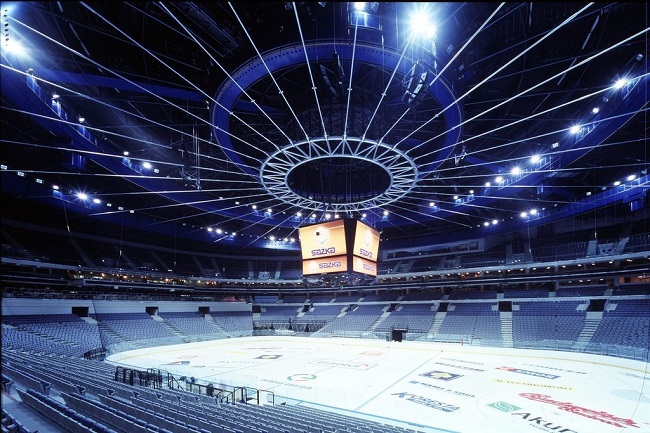
The Libeň hall was one of the reasons for the collapse of the lottery company Sazka
 |
Prague - The multipurpose arena in Prague, currently known as the O2 arena, was one of the main reasons for the bankruptcy of the lottery company Sazka years ago. The construction on the border of Libeň and Vysočany, which cost more than seven billion crowns, opened 20 years ago on March 27, 2004, after approximately 17 months of construction, and over the years has become an important part of public life in Prague. It hosts hockey matches, tennis tournaments, or parkour competitions, as well as concerts by the biggest global and Czech stars.
The largest Czech arena, which is now under the investment group PPF, has a capacity of up to 18,000 spectators, but the number of visitors varies depending on the event. Since 2004, the O2 arena has hosted more than 13 million people, with a record year being 2015, when it hosted the Ice Hockey World Championship for the second time and welcomed over a million visitors. The first time the Ice Hockey World Championship took place in the Libeň arena was at the turn of April and May 2004, and this year, the O2 arena will host the championship for the third time.
The organization of the world hockey championship title matches was one of the main reasons why plans for a new arena began in Prague at the turn of the millennium. The championship was originally scheduled to be held in 2003, and when the International Ice Hockey Federation (IIHF) awarded it to the Czech Republic in May 2000, the construction of a new arena was a main condition. At that time, the most modern hockey venue in the Czech capital was the Sports Hall at the Výstaviště, which was built at the turn of the 1950s and 60s and hosted the World Championships in 1972, 1978, 1985, and 1992.
The original concept from the hockey association planned to build the arena in Hagibor, but the preparations were slowed down by disputes over the ownership of the selected land. The Finnish investor Multi-Arena Prague, which was initially responsible for the project, could not begin construction work in time and ensure the timely completion of the arena. Thus, the association began negotiations with the city council about the possibility of building in another location. In the summer of 2001, the lottery company Sazka entered the scene.
Just a few months earlier, in May 2001, the International Ice Hockey Federation agreed with the Czech association to exchange the hosting of the World Championship with Finland, where the championship was originally to be held in 2004. The Czech Republic thus gained another year for the arena to be built. After abandoning Hagibor, there was also consideration for a location in Maniny, but ultimately the choice fell on the grounds of the former ČKD Lokomotivka factory on the border of Libeň and Vysočany.
Sazka had a close connection to sports; its shareholders were sports organizations. The largest share in the company, nearly 68 percent, was held by the Czech Union of Physical Education (ČSTV), which included the Czech Ice Hockey Union among its members, and representatives of athletes were active in Sazka's bodies. Thus, the decision to build a new arena made some sense. Initially, it was said that the construction would cost around two billion crowns, but in the end, the arena cost 7.2 billion crowns, with Sazka raising money through bonds.
Sazka's profit was directed towards supporting sports and physical education, but due to the repayments for the arena (it opened as Sazka Arena, and has been called O2 Arena since March 2008), significantly less money went to sports. Even in 2003, the company paid out more than a billion to its shareholders. However, the amount dropped afterward; in 2008 it was about 446 million crowns, in the following year only 179 million, and in 2010 it was 234 million crowns. Due to the repayments for the arena, Sazka ran into troubles, which culminated at the turn of 2010 and 2011.
The accumulated debts (more than two thousand creditors filed claims, with the insolvency administrator only recognizing claims worth about 15 billion from total claims of over 40 billion crowns) led to the declaration of bankruptcy in May 2011. The highest bid for the lottery company came from the companies PPF and KKCG, amounting to 3.81 billion crowns. As a consequence of Sazka's troubles was the fall of its long-time CEO Aleš Hušák, who led the company from the spring of 1995 until the summer of 2011.
Throughout 2012, PPF and KKCG together also took control of Bestsport, which owned the arena and had similar shareholders as Sazka. At that time, an expert valuation estimated the O2 arena at no more than 1.57 billion crowns. By fall 2012, the lottery company Sazka was completely controlled by KKCG, and about a year later, both companies agreed on the future of the arena. At the turn of 2012 and 2013, the investment group PPF became the new majority owner of the O2 arena.
The English translation is powered by AI tool. Switch to Czech to view the original text source.
0 comments
add comment
Related articles
0
10.04.2018 | The costs for the construction of the multifunctional hall near O2 Arena are 1.2 billion CZK
0
29.04.2015 | The retractable stands in the O2 arena were damaged by the mass jumping of fans
0
27.03.2009 | O2 (Sazka) arena celebrates five years since its opening
1
20.01.2009 | Bestsport is suing the company Skanska for the overpriced Sazka Arena






